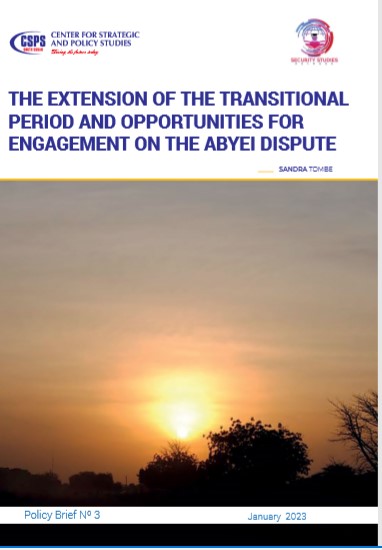- Version
- Download 149
- File Size 493.92 KB
- File Count 1
- Create Date January 10, 2023
- Last Updated January 10, 2023
THE EXTENSION OF THE TRANSITIONAL PERIOD AND OPPORTUNITIES FOR ENGAGEMENT ON THE ABYEI DISPUTE
SUMMARY
• Political upheaval in South Sudan and Sudan has resulted in a relegation of the Abyei issue to the periphery and suspending a final resolution to the dispute. Ending politicians’ disengagement on the Abyei issue means recommitting to internationally recognized mechanisms designed to resolve the simmering conflict in the region.
• The extension of the transitional period has a potentially positive implication for South Sudan in the context of Abyei because it allows South Sudan to nurture governance institutions in the Abyei region as it does—though modestly—elsewhere in the country. While this investment will not translate to votes when South Sudanese citizens do eventually go to the polls, it may result in stronger institutions that facilitate governance and development of the Abyei region, further strengthening South Sudan as a contender for Abyei.
Spanning over two thousand kilometers, the border between Sudan and now South Sudan continues to pose threat to peace and security for the continent’s newest state. Nowhere is this threat more urgent than in the context of the Abyei region, a disputed oil and farmland area which sits at the center of the northern border of South Sudan. That Abyei continues to tie the two countries, both of which are experiencing volatile political conditions, necessitates thinking through the future of this region and the capacity of the South Sudanese state to envision its engagement with the region. With recent attacks since February taking the lives of hundreds and displacing over 100,000 people, the costs of the Abyei conflict are often immeasurable.1 Drawing on existing literature and the latest developments in the border region and the two states, this brief will provide a summary background of the Abyei tension, situate this tension in the context of the R-ARCSS and the political climate in Sudan, and then draw relevant recommendations for South Sudanese policymakers and external partners.
Attached Files
| File | Action |
|---|---|
| Policy Brief 3AbyeiFinal06.1.2023.pdf | Download |

